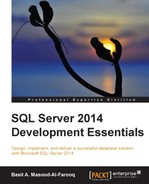- SQL Server 2014 Development Essentials
- Table of Contents
- SQL Server 2014 Development Essentials
- Credits
- About the Author
- Acknowledgments
- About the Reviewers
- www.PacktPub.com
- Preface
- 1. Microsoft SQL Server Database Design Principles
- 2. Understanding DDL and DCL Statements in SQL Server
- Understanding the DDL, DCL, and DML language elements
- Understanding the purpose of SQL Server 2014 system databases
- An overview of database recovery models
- Creating and modifying databases
- Creating and managing database schemas
- Creating and managing tables
- Grant, deny, and revoke permissions to securables
- Summary
- 3. Data Retrieval Using Transact-SQL Statements
- 4. Data Modification with SQL Server Transact-SQL Statements
- 5. Understanding Advanced Database Programming Objects and Error Handling
- Creating and using variables
- Control-of-flow keywords
- Creating and using views
- Creating and using stored procedures
- Creating and using user-defined functions
- Creating and using triggers
- Handling Transact-SQL errors
- Summary
- 6. Performance Basics
- Components of SQL Server Database Engine
- The SQL Server 2014 in-memory OLTP engine
- Indexes
- The cost associated with indexes
- How SQL Server uses indexes
- The structure of indexes
- Index types
- Guidelines for designing and optimizing indexes
- Avoid overindexing tables
- Create a clustered index before creating nonclustered indexes when using clustered indexes
- Index columns used in foreign keys
- Index columns frequently used in joins
- Use composite indexes and covering indexes to give the query optimizer greater flexibility
- Limit key columns to columns with a high level of selectability
- Pad indexes and specify the fill factor to reduce page splits
- Rebuild indexes based on the fragmentation level
- Query optimization statistics
- The fundamentals of transactions
- SQL Server 2014 tools for monitoring and troubleshooting SQL Server performance
- Summary
- Index
Data integrity ensures that the data within the database is reliable and adheres to business rules. Data integrity falls into the following categories:
- Domain integrity: This ensures that the values of the specified columns are legal, which means domain integrity ensures that the value meets a specified format and value criteria. You can enforce domain integrity by restricting the type of data stored within columns (through data types), the format (through
CHECKconstraints and rules), or the range of possible values (throughFOREIGN KEYconstraints,CHECKconstraints,DEFAULTdefinitions,NOT NULLdefinitions, and rules). - Entity integrity: This ensures that every row in the table is uniquely identified by requiring a unique value in one or more key columns of the table. You can enforce entity integrity through indexes,
UNIQUE KEYconstraints,PRIMARY KEYconstraints, orIDENTITYproperties. - Referential integrity: This ensures that the data is consistent between related tables. You can enforce referential integrity through
PRIMARY KEYconstraints andFOREIGN KEYconstraints. - User-defined integrity: This ensures that the values stored in the database remain consistent with established business policies. You can maintain user-defined integrity through business rules and enforce user-integrity through stored procedures and triggers.
-
No Comment
..................Content has been hidden....................
You can't read the all page of ebook, please click here login for view all page.
